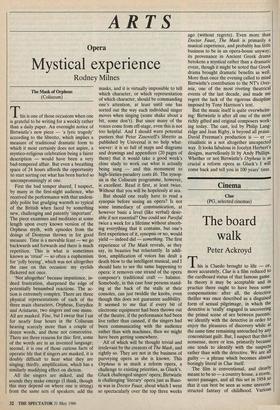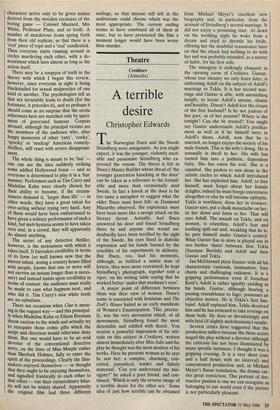Cinema
Clue (PG, selected cinemas)
The board walk
Peter Ackroyd
This is Cluedo brought to life — or, more accurately, Clue is a film reduced to the cardboard status of that famous game. In theory it may be acceptable and in practice there ought to have been some compensations: after all, the detective thriller was once described as a disguised form of sexual pilgrimage, in which the detective is `really' engaged in uncovering the primal scene of sex between parents; we identify with the detective in order to enjoy the pleasures of discovery while at the same time remaining untouched by any concomitant guilt. But, I suspect that this is nonsense, more or less, primarily because one tends to identify with the suspects rather than with the detective. We are all guilty — a phrase which becomes almost boringly literal in Clue itself. The film is conventional, and clearly meant to be so — a country house, a storm, secret passages, and all this set in 1954 so that it can best be seen as some unrecon- structed fantasy of childhood. Various characters arrive only to be given names derived from the wooden creatures of the boring game — Colonel Mustard, Mrs White, Professor Plum, and so forth. A number of murderous items spring forth from their old replicas, so that there is a `real' piece of rope and a 'real' candlestick. Then everyone starts running around in circles murdering each other, with a de- nouement which lasts almost as long as the action itself.
There may be a soupcon of truth in the theory with which I began this review, however, since everyone in sight is being blackmailed for sexual malpractice of one kind or another. The psychologists tell us that sex invariably leads to death (for the fortunate, it precedes it), and so perhaps it should come as no surprise that the erotic references here are matched only by speci- mens of graveyard humour. Corpses abound, although the principal victims are the members of the audience who, after happy memories of other 'zany', 'cooky', spooky' or 'madcap' American comedy- thrillers, will react with severe disappoint- ment.
The whole thing is meant to be `fun' one can see the idea suddenly striking some addled Hollywood brain — and so everyone is determined to play it in a `fun' manner. Performers such as Tim Curry and Madeline Kahn were clearly chosen for their ability to become, if the circum- stances demand it, 'larger than life' — in other words, they have a great talent for over-acting without trying very hard. Any of them would have been embarrassed to have given a solitary performance of such a kind, but mob hysteria seems to have taken over and, in a crowd, they will apparently do almost anything. The secret of any detective thriller, however, is the seriousness with which it takes itself. It foresakes credibility in terms of its form (so well known now that the merest infant, seeing a country house filled with people, knows that one or more will not survive an instant longer than is neces- sary) and instead insists upon credibility in terms of content: the audience must really be made to care what happens next, and who did it. Tim Curry's nice white teeth are no substitute.
There are occasions when Clue is amus- ing in the vaguest way — and this principal- ly when Madeline Kahn or Eileen Brennan throw caution to the winds and actually try to reacquire those comic gifts which the script and direction would otherwise deny them. But one would have to be an avid devotee of the conventional detective story, on the lines of Miss Marple rather than Sherlock Holmes, fully to enter the spirit of the proceedings. Clearly the film- makers enjoyed themselves — or thought that they ought to be enjoying themselves, and signalled frantically to each other to that effect — but their extraordinary hilar- ity will not be widely shared. Apparently the original film had three different endings, so that anyone still left in the auditorium could choose which was the most appropriate. The current ending seems to have combined all of them at once, but to have protracted the film a moment longer would have been worse than murder.



























































 Previous page
Previous page